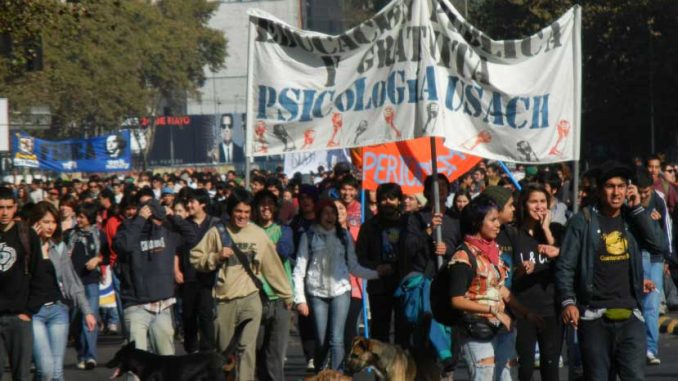
When Lauren Bateman began her semester in Santiago, Chile during Spring 2011, she had no idea she would soon be living in the thick of a major government protest. A few months into her stay, thousands of Chilean students took to the streets to march for their right to free education.
“I wasn’t really allowed to participate because of my student visa. If I’d been caught protesting I could have been sent home,” Bateman said. “But my host sister would participate in marches, and I followed [the protests while I was] there and after I came back to the United States. The movement is still active now, and I thought it was important to investigate it more.”
The senior Spanish and communications major traveled again to Chile last summer to report on media representations of the student riots. With funding from the Diamond Research Scholars Program, she spent 10 weeks living in Santiago, conducting interviews with local Chileans and comparing newspaper, television and social media coverage at the height of the movement.
The sum of her work will be presented in the form of a poster at the Global Temple Conference on Wednesday, Nov. 14.
The day-long event will showcase student and faculty research that focuses on worldwide issues and will feature almost 30 presentations, including film screenings, poster sessions, panels and creative performances. This will be Temple’s seventh year hosting the conference.
Organized by the Office of International Affairs, this year’s title is “Global and Local: Temple’s Dynamic Mix,” meant to illustrate the many ways that Temple and Philadelphia’s multiethnic communities reflect its broad global connections.
Anthropology professor Jayasinhji Jhala, director of Temple’s India study abroad program and often a collaborator with students in conference-presented work, considers international exposure to be an important aspect of education in modern society.
“In Philadelphia, 104 languages are spoken,” Jhala said, highlighting the conference’s local theme. “We live in a globalized world. Having a global perspective — or any perspective outside your own — makes you more valuable, more equipped and ultimately makes you a better American.”
He also emphasizes the opportunities given to students who participate in the event.
“How many people [in their early 20s] have the opportunity to present at a conference? My students may use this to get their foot in the door and present their original work for the first time,” Jhala said. “It allows them to be surveyors of information, rather than passive learners. Many use it as a stepping stone to graduate or other professional schools.”
Though international travel is not required for conference eligibility, some student-presenters did complete their research overseas.
During the summer, fellow panelists and senior political science majors Nadia Elboubkri and Kat Zuk visited Morocco and France, respectively, and will each present their individual research on the panel entitled “Political Resistance and Democratization in North African and Arab States.”
On her travels, Elboubkri said, “It was an amazing experience, and definitely boosted my project in a direction that library research couldn’t have achieved on its own.”
All student posters and papers have the opportunity to win prizes for their work. Many, however, applied to participate in the conference for other reasons.
“I’m hoping to receive some constructive feedback on my research so far — but moreover, I hope that this conference will make the Temple community think about the realities of our world and inspire them to have a greater global presence,” Zuk said.
Senior metals major Rosemary Carlson, who will present a series of paintings that deal with identity, memory and place, cited her experience studying abroad in Rome and moving often as a child as inspiration for her interest in this global topic.
“I think the experiences of adaptation and its subsequent growth are universal,” Carlson said. “I really enjoyed talking to immigrants, other study abroad students, expats, etc. about this phenomenon and finding camaraderie in unexpected places. In the end, the place is not the focus. Rather the relationships you build and how you remember, grow and learn based on such experiences are what matter the most.”
The Global Temple Conference will begin at 9 a.m. with a speech by former Chairman of the U.S. International Trade Commission Peter Watson, titled “The Next President’s Greatest Global Challenge: Preventing Conflict in Asia/the Pacific as Consensus for U.S. Regional Leadership Erodes.”
Presentations will take place on the second floor of the Student Center. All students, staff and faculty are invited to attend. A full schedule can be found on Temple’s Study Abroad website.
Julie Zeglen can be reached at julie.zeglen@temple.edu.



Be the first to comment